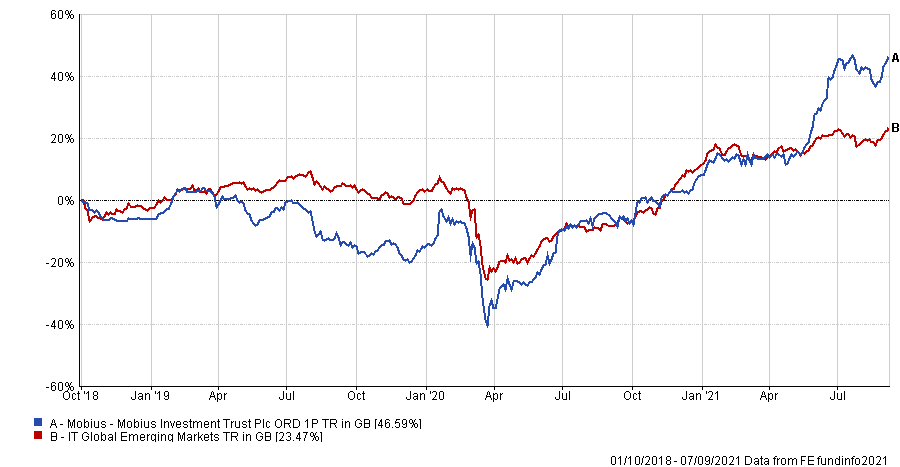Investors should not have been surprised by China’s recent tech crackdown, as heavy-handed government intervention has always been one of the biggest threats to emerging markets.
This is according to Carlos Hardenberg, the co-manager of the £151m Mobius Investment Trust, who said regulation against big technology stocks is neither new, nor limited to China.
Last month, shares in major Chinese technology companies such as Alibaba and Tencent dropped after regulators in Beijing moved to tighten control of the sector.
Shares in both groups are down this year, with Alibaba around 25% lower, while Tencent is off around 8%.
“When we talk about the regulation in Big Tech, it is not a China phenomenon, it is happening in the US and Europe, where governments are trying to target the gigantic tech businesses. They become quasi-monopolies,” said Hardenberg.
“It is no different in China. The fact that Tencent, Alibaba etcetera are being taken on by the regulator should not come as a big surprise.”
This is one of the reasons why the manager has been more selective when choosing Chinese stocks. Despite dominating the MSCI Emerging Markets index – China accounts for more than a third – Mobius Investment Trust has just 13.9% in the country.
“We have been cautious and conservative in our investment approach to China and have navigated away from sectors that are exposed to regulatory pressure,” Hardenberg said.
“We have taken a simple route, looking at quality companies with a good track record that are listed in Hong Kong, which is probably the safer play.”
Hardenberg added that companies in China often have a combination of “unusual accounting, poor transparency and badly translated reports”, which makes it tough to invest in the region, but some businesses bucked the trend.
Yum China, the fifth largest holding in the trust, is one example. The successful restaurant chain has a western management team, with “good transparency” and “strong financials”. “It is probably our most boring stock,” he said.
He and co-manager Mark Mobius have focused their attention on India, which is the portfolio’s largest weighting at 26.8%.
“We have a set of rigorous criteria that we search for including innovation, strong balance sheets without the trouble of leverage, and being leaders in technology or branding, and India brings together many aspects that meet our bill,” Hardenberg said.
Although the macroeconomic environment can be challenging in India, over the past couple of years there has been a concerted effort by many companies to expand their horizons beyond the border.
“Increasingly India has prepared itself to become more competitive as an exporter, with businesses that are competitive domestically conquering new areas. Old India was all about the first wave of consumption, infrastructure, banks and telecoms, but now we are seeing it is allowing smaller businesses to flourish,” he said.
New reforms have made it a much “friendlier” market for both businesses and investors, which has allowed the entrepreneurs in the region to flourish.
One example is Persistent Systems, an IT business that formerly implemented software designed by US giant IBM, but shifted towards developing its own intellectual property.
“It is now one of the leading providers of IT services for the healthcare sector globally as well as factory automation. It saw a niche and moved very aggressively into it,” the manager said.
It is one of a number of Indian equities held within the trust that has performed well in recent years. Hardenberg said that the Indian equity part of the portfolio had beaten the wider Indian market by 40 percentage points over the past 18 months.
Total return of trust vs sector since launch

Source: FE Analytics
Overall, the trust has made 46.6% since its launch in October 2018, a top-quartile effort among its IT Global Emerging Markets peers, which have made an average of 23.5%. It has no yield and an OCF of 1.5%. Shares are currently on a 1.6% discount to the net asset value.





